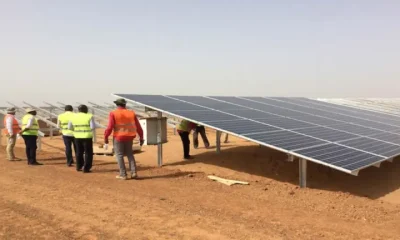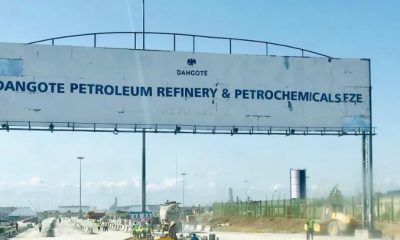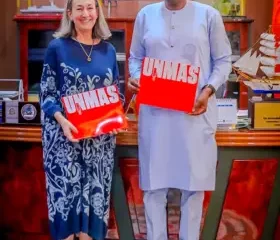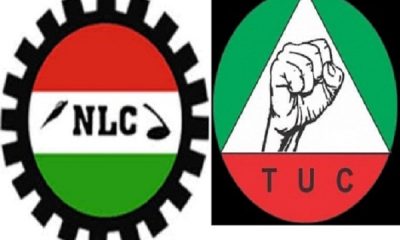Headline
FG removes VAT on diesel for six months

The Federal Government, in an effort to cushion the effects of the recent removal of the fuel subsidy, has declared the removal of the value-added tax (VAT) on diesel for the coming six months.
This announcement was made public by Femi Gbajabiamila, the Chief of Staff to President Bola Tinubu, after the conclusive discussions with the leadership of the Nigeria Labour Congress (NLC) and Trade Union Congress (TUC).
Key resolutions from the meeting include:
The approval of a N25,000 provisional wage increment for all treasury-paid federal government workers over a period of six months.
The commitment of the Federal Government to expedite the delivery of Compressed Natural Gas (CNG) buses to mitigate public transportation challenges that have risen from the removal of the PMS subsidy.
A pledge to allocate funds specifically for micro and small-scale enterprises.
An acknowledgment of the 8.57% spike in diesel prices, as reported by the National Bureau of Statistics, with consumers now paying an average of N854.32 per litre, a significant rise from N786.88 per litre from the previous year.
The commencement of payments, by the Federal Government, of N75,000 to 15 million households at N25,000 monthly from October to December 2023.
The National Bureau of Statistics had highlighted a worrying trend in diesel prices which, spurred by a 7.5% VAT and forex challenges, catapulted from N650 per litre to nearly N950. In light of these developments, Bennett Korie, the President of the Natural Oil and Gas Suppliers Association of Nigeria, had emphasized the severe impact of the VAT on diesel, which had propelled pump prices to staggering heights across the nation.
The meeting, which saw the participation of prominent figures including Lagos State Governor, Babajide Sanwo-Olu, Governor Abdulrazak Abdulrahman of Kwara State, and Governor Dapo Abiodun of Ogun State, also touched upon the longstanding issues between the Road Transport Employees Association of Nigeria (RTEAN) and National Union of Road Transport Workers (NURTW) in Lagos State.
Both NLC and TUC are currently deliberating the propositions made by the Federal Government with the aim of potentially halting their planned industrial action, allowing further discussions on the actualization of the aforementioned resolutions.
The Minister of Information and National Orientation, Mallam Mohammed Idris, emphasized the Federal Government’s dedication to addressing these pressing concerns, urging that solutions are more feasible with workers at their stations rather than on strike. The labor delegation, which was headed by NLC President Joe Ajaero and included notable leaders from both NLC and TUC, seemed hopeful for the forthcoming consultations.
Headline
EFCC bars dollar transactions, orders embassies to charge in naira

The Economic and Financial Crimes Commission has barred foreign missions based in Nigeria from transacting in foreign currencies and mandated them to use Naira in their financial businesses.
The EFCC has also mandated Nigerian foreign missions domiciled abroad to accept Naira in their financial businesses.
The anti-graft agency said the move is to tackle the dollarisation of the Nigerian economy and the degradation of the naira
The Commission, therefore, asked the government to stop foreign missions in Nigeria from charging visa and other consular services in foreign denominations.
The EFCC gave the advisory in a letter to the Minister of Foreign Affairs, Amb. Yusuf Tuggar, for onward transmission to all foreign missions in the country.
In the letter, the EFCC said it issued the advisory because the practice of paying for consular services in dollars was in conflict with extant laws and financial regulations in Nigeria.
In a letter dated April 5, 2024, which was addressed to the Minister of Foreign Affairs, Ambassador Yusuf Tuggar, titled: “EFCC Advisory to Foreign Missions against Invoicing in US Dollar,” the EFCC Chairman, Ola Olukoyede expressed dismay over the invoicing of consular services in Nigeria by foreign missions in dollars.
The EFCC cited Section 20(1) of the Central Bank of Nigeria Act, 2007, which makes currencies issued by the apex bank the only legal tender in Nigeria.
The letter read, “I present to you the compliments of the Economic and Financial Crimes Commission, and wish to notify you about the commission’s observation, with dismay, regarding the unhealthy practice by some foreign missions to invoice consular services to Nigerians and other foreign nationals in the country in United States dollar ($).
“It states that ‘the currency notes issued by the Bank shall be the legal tender in Nigeria on their face value for the payment of any amount’.
“This presupposes that any transaction in currencies other than the naira anywhere in Nigeria contravenes the law and is, therefore, illegal.”
The commission further stated that the rejection of the naira for consular services in Nigeria by certain missions, along with non-compliance with foreign exchange regulations in determining service costs, is not just unlawful but also undermines the nation’s sovereignty embodied in its official currency.
The letter continues: “This trend can no longer be tolerated, especially in a volatile economic environment where the country’s macroeconomic policies are constantly under attack by all manner of state and non-state actors.
“In light of the above, you may wish to convey the commission’s displeasure to all missions in Nigeria and restate Nigeria’s desire for their operations not to conflict with extant laws and regulations in the country.”
Diplomatic sources said yesterday, May 10, that some embassies were wondering whether the EFCC’s advisory represented the position of the Federal Government.
Headline
Prince Harry visits sick Nigerian soldiers in Kaduna

Prince Harry and his team visited the 44 Nigerian Army Reference Hospital in Kaduna to interact with wounded soldiers who are receiving treatment.
The Duke of Sussex is in Nigeria with his wife to champion the Invictus Games, which Harry founded to aid the rehabilitation of wounded and sick servicemembers and veterans.
Nigeria joined the Invictus Community of Nations in 2022 becoming the first African country to join.
Prince Harry’s visit to Kaduna came 68 years after his late grandmother Queen Elizabeth II visited the state during the time of the late Premier of Northern Region Sir Ahmadu Bello.




-

 Headline2 days ago
Headline2 days agoSuspend cybersecurity levy– Reps to CBN
-

 Headline2 days ago
Headline2 days agoTinubu resumes work after foreign trip
-

 Business2 days ago
Business2 days agoNigeria needs over $2bn to revive Ajaokuta Steel Plant, says Minister
-

 Entertainment3 hours ago
Entertainment3 hours agoAMVCA Cultural Day: BBNaija’s Neo, Venita win Best Dressed Male, Female
-

 Metro3 hours ago
Metro3 hours agoEx-Sports Minister laments after hospital neglected him for hours over N80000 deposit
-

 Headline3 hours ago
Headline3 hours agoPrince Harry visits sick Nigerian soldiers in Kaduna
-

 News2 days ago
News2 days agoShan George’s money returned to Zenith Bank account















